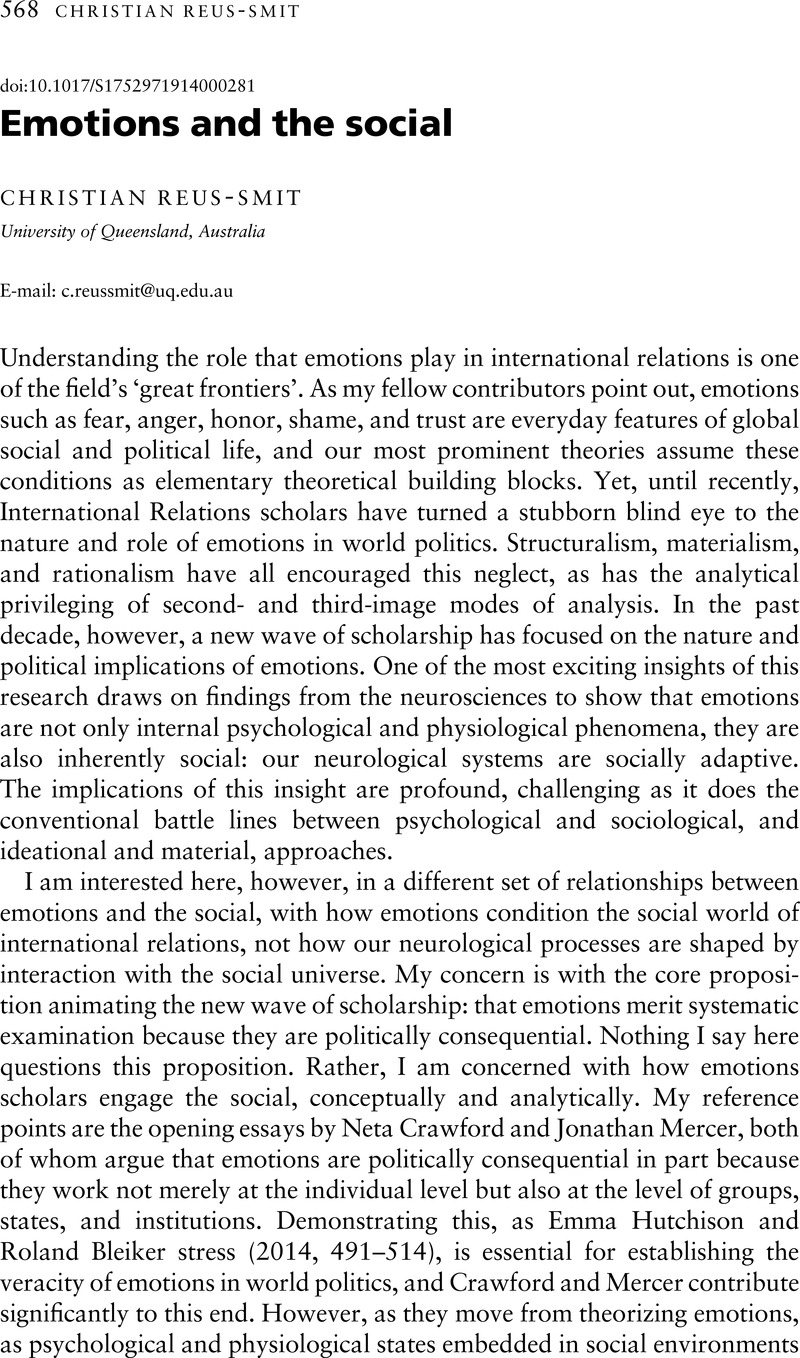Crossref Citations
This article has been cited by the following publications. This list is generated based on data provided by Crossref.
Branch, Jordan
2016.
How should states be shaped? Contiguity, compactness, and territorial rights.
International Theory,
Vol. 8,
Issue. 1,
p.
1.
Prakash, Deepa
and
Ilgit, Asli
2017.
More than a feeling: Emotional responses to international criticism in Erdoğan’s Turkey.
Review of International Studies,
Vol. 43,
Issue. 1,
p.
130.
Clément, Maéva
and
Sangar, Eric
2018.
Researching Emotions in International Relations.
p.
1.
Eroukhmanoff, Clara
and
Teles Fazendeiro, Bernardo
2018.
Researching Emotions in International Relations.
p.
255.
Van Rythoven, Eric
2018.
Fear in the crowd or fear of the crowd? The dystopian politics of fear in international relations.
Critical Studies on Security,
Vol. 6,
Issue. 1,
p.
33.
Åhäll, Linda
2018.
Affect as Methodology: Feminism and the Politics of Emotion1.
International Political Sociology,
Vol. 12,
Issue. 1,
p.
36.
Lynggaard, Kennet
2019.
Methodological Challenges in the Study of Emotions in Politics and How to Deal With Them.
Political Psychology,
Vol. 40,
Issue. 6,
p.
1201.
Baker, Joshua
2019.
The Empathic Foundations of Security Dilemma De‐escalation.
Political Psychology,
Vol. 40,
Issue. 6,
p.
1251.
Adler, Emanuel
2019.
World Ordering.
Bayram, A. Burcu
and
Holmes, Marcus
2020.
Feeling their pain: affective empathy and public preferences for foreign development aid.
European Journal of International Relations,
Vol. 26,
Issue. 3,
p.
820.
Magcamit, Michael
2021.
To feel is to believe: China, United States, and the emotional beliefs of Philippines’ Rodrigo Duterte.
Political Science,
Vol. 73,
Issue. 1,
p.
6.
Ish-Shalom, Piki
Kornprobst, Markus
and
Pouliot, Vincent
2021.
Theorizing World Orders.
Lonardo, Luigi
2021.
The Past and Present of Public Humiliation.
The International Spectator,
Vol. 56,
Issue. 2,
p.
151.
Pratt, Simon Frankel
2021.
Theorizing World Orders.
p.
81.
Bentley, Michelle
2022.
A New Model of “Taboo”: Disgust, Stigmatization, and Fetishization.
International Studies Review,
Vol. 24,
Issue. 3,
Van Rythoven, Eric
2022.
Walter Lippmann, emotion, and the history of international theory.
International Theory,
Vol. 14,
Issue. 3,
p.
526.
Kadir, Jawad
and
Jawad, Majida
2022.
The role of emotions in interstate relations: Using an interpersonal conflict model to reconceptualize Pakistan’s obsession vis-a-vis India.
Asian Journal of Comparative Politics,
Vol. 7,
Issue. 3,
p.
399.
Schramm, Madison
2022.
“As Inscrutable as the Sphinx, but Far More Dangerous”: Trends in Democratic–Personalist Conflict.
Journal of Global Security Studies,
Vol. 8,
Issue. 1,
Cohen Kaminitz, Shiri
2023.
The significance of GDP: a new take on a century-old question.
Journal of Economic Methodology,
Vol. 30,
Issue. 1,
p.
1.
Kwiatkowski, Lynn
and
Friederic, Karin
2024.
Introduction to the gender violence, emotion, and the state symposium.
Feminist Anthropology,
Vol. 5,
Issue. 1,
p.
7.



